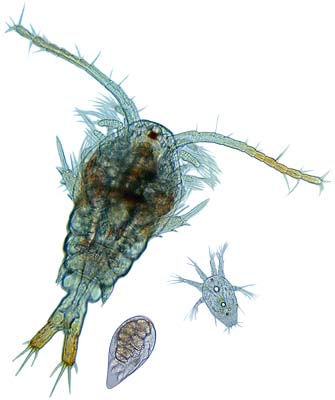June 13, 2004
Bugaboos
 I'm
a couple of weeks late learning about the copepods in New
York City's water, which the original complaint apparently called "insects",
and which the International Herald Tribune refers
to as "bugs".
The University of Michigan's
Animal Diversity Web makes it clear that these oar-footed critters
are aquatic crustaceans, and not insects at all. Second cousins once removed
of insects, at best. The phylum
arthropoda splits into subphyla that include crustacea
and uniramia;
there are five classes of crustaceans, of which the maxillopoda
are one; and the maxillopods include "barnacles, copepods,
mystacocarids, tantulocarids, branchiurans, ostracods, and related groups".
Down the other branch of the arthropod family, the uniramian subphylum includes millipedes,
centipedes, and insects as classes.
I'm
a couple of weeks late learning about the copepods in New
York City's water, which the original complaint apparently called "insects",
and which the International Herald Tribune refers
to as "bugs".
The University of Michigan's
Animal Diversity Web makes it clear that these oar-footed critters
are aquatic crustaceans, and not insects at all. Second cousins once removed
of insects, at best. The phylum
arthropoda splits into subphyla that include crustacea
and uniramia;
there are five classes of crustaceans, of which the maxillopoda
are one; and the maxillopods include "barnacles, copepods,
mystacocarids, tantulocarids, branchiurans, ostracods, and related groups".
Down the other branch of the arthropod family, the uniramian subphylum includes millipedes,
centipedes, and insects as classes.
The Smithsonian has a great copepod page, with pictures and a lot of other interesting information (though there are no recipes :-)).
Whether or not copepods are bugs is less clear. Middle English bugge is thought to have been derived from Welsh bwg "ghost", and originally meant "object of terror, usually imaginary", a sense that survives only in forms like bugbear, bugaboo, bogey and boggle. At some point, the word came to be used for insects, especially members of the order heteroptera, which biologists call "true bugs"..
The other extended senses of bug are varied, specific, and curiously unrelated to one another. The OED's compilation includes:
a. "A person obsessed by an idea; an enthusiast." (e.g. litterbug, firebug).
b. "A defect or fault in a machine, plan or the like."
d. "A microbe or germ; also, a disease."
f. "A concealed microphone."
The OED provides citations for sense 3.b. from 1889 on:
1889 Pall Mall Gaz. 11 Mar. 1/1 Mr. Edison, I was informed, had been up the two previous nights discovering ‘a bug’ in his phonograph--an expression for solving a difficulty, and implying that some imaginary insect has secreted itself inside and is causing all the trouble.
and more of the history is available in the current edition of the Jargon Lexicon, which points out that "in jargon the word [bug] almost never refers to insects. Here is a plausible conversation that never actually happened: 'There is a bug in this ant farm!' 'What do you mean? I don't see any ants in it.' 'That's the bug.'"
In this sense, the copepods in the New York City water supply are bugs. At least, they're certainly not features.
Posted by Mark Liberman at June 13, 2004 06:48 AM